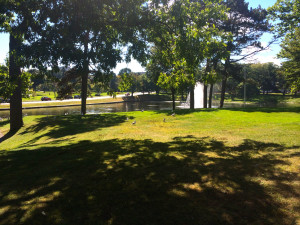The City’s Transportation, Sustainability and Energy Committee will delay a project to replace the bottom of Deering Oaks Pond with gravel and concrete to learn more about green options to improve the pond.
The 3.5 acre pond near State Street in Deering Oaks Park was created around 1880 from damming tidal flats during a sewer installation on what is now State Street. In recent years the City has worked to improve the pond’s water quality and aesthetics. The primary issues are from fecal coliform, algae blooms and stagnation.
At the Committee’s September 17th meeting, the Public Services department recommended that the City use an EPA grant and $500,000 of local funding on a $1 million project to replace the pond bottom with a combination of gravel and precast concrete blocks.
”We are essentially paving over a wetland,” said Amanda Martin, an Environmental Studies student at USM. Martin became interested in the City’s plans while researching a project on Deering Oaks Pond as a wetland where birds and other wildlife find food and shelter.The existing pond bottom is too soft to allow city crews to clean it with excavators and other large equipment. In 2010, after years of accumulation, city crews removed 4000 cubic yards of trash, leaves, sediment and debris from the pond. In 2013 City crews got an excavator trapped in the pond’s muck.
Martin pointed out that if the pond was under Maine DEP jurisdiction that they would require looking at green options, such as vegetation that can soak up metals and pollutants, along with gray options, such as paving. “We haven’t even considered the alternatives and that is what bothers me about this,” said Martin.
Friends of Deering Oaks Park supports the project because they think it will improve the algae problem in the pond, but Martin pointed out that what some call algae is actually water lentils, or duckweed, an important source of food for the ducks that call the pond home.
“I’d liked to be assured that we’ve examined other ways to improve the natural ecosystem there,” said Councilor Jon Hinck, a member of the Committee.
The committee requested more information on green options to explore if introducing wetland plantings rather than replacing the pond’s bottom will better enhance pond water quality. The question remains, is the pond a fountain or a wetland?






